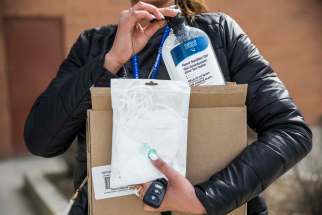Pandemic threatens farmers’ odds of bouncing back after 2019 weather misery
Read this article for free:
or
Already have an account? Log in here »
To continue reading, please subscribe:
Monthly Digital Subscription
$0 for the first 4 weeks*
- Enjoy unlimited reading on winnipegfreepress.com
- Read the E-Edition, our digital replica newspaper
- Access News Break, our award-winning app
- Play interactive puzzles
*No charge for 4 weeks then price increases to the regular rate of $19.00 plus GST every four weeks. Offer available to new and qualified returning subscribers only. Cancel any time.
Monthly Digital Subscription
$4.75/week*
- Enjoy unlimited reading on winnipegfreepress.com
- Read the E-Edition, our digital replica newspaper
- Access News Break, our award-winning app
- Play interactive puzzles
*Billed as $19 plus GST every four weeks. Cancel any time.
To continue reading, please subscribe:
Add Free Press access to your Brandon Sun subscription for only an additional
$1 for the first 4 weeks*
*Your next subscription payment will increase by $1.00 and you will be charged $16.99 plus GST for four weeks. After four weeks, your payment will increase to $23.99 plus GST every four weeks.
Read unlimited articles for free today:
or
Already have an account? Log in here »
Hey there, time traveller!
This article was published 02/04/2020 (2080 days ago), so information in it may no longer be current.
Heavy precipitation in late summer and fall resulted in a miserable 2019 for Manitoba farmers who were left with a stunning amount of unharvested crops.
And things could get worse, as uncertainty about labour availability during the COVID-19 pandemic threatens producers’ ability to meet spring seeding deadlines.
“The biggest thing that we are experiencing is the uncertainty,” Keystone Agricultural Producers president Bill Campbell said Thursday.
“Most of the time we would be able to adapt to that, and everybody deals with that on a yearly basis, but this year is more widespread and more unique, and more challenging than I’ve ever encountered in my 50 years of farming.”
Campbell said that in his area of southwestern Manitoba, crop insurance reported more than 100,000 acres of unharvested crops after last year’s storms.
Farmers eager to prepare unharvested fields for the new growing season will have to wait until the snow clears and the weather warms enough to operate machinery, narrowing the already short window for seeding new crops.
More than 60,000 seasonal and temporary workers come to Canada each year to work in the agriculture industry. Many arrive through federal programs such as the Seasonal Agricultural Worker Program (SAWP), which allows employers to hire temporary foreign workers for a period of eight months to do the labour-intensive jobs many Canadians avoid.
“Right now it is spring time, that is the peak season when migrant workers come to Canada,” Gabriel Allahdua, a seasonal worker from St. Lucia, said Thursday.
Last month the federal government granted farmers the ability to hire migrant workers through the pandemic, so long as they self-isolate for two weeks upon arrival.
“We’re probably stretched thin and to the maximum to begin with, because of the seasonality of it, and then if we take, say, 25 per cent of your labour force and they don’t show up, how do you manage?”
Keystone Agricultural Producers president Bill Campbell
Campbell said migrant workers have a “huge impact” on farm operations, and any delays will put additional strain on the industry.
“We’re probably stretched thin and to the maximum to begin with, because of the seasonality of it, and then if we take, say, 25 per cent of your labour force and they don’t show up, how do you manage?” he said. “We don’t know how we manage.”
It’s uncertain how migrant workers themselves will manage, Allahdua pointed out. While the federal government provided guidelines for farmers mandating that migrant workers do not work during the two-week self-isolation period, that rule doesn’t apply to those deemed essential by public-health officials.
Chris Ramsaroop, a representative for volunteer-run advocacy group Justicia for Migrant Workers, said he’s been made aware of some employers who plan to use that loophole to get migrants working before the two weeks are up.
“There have been no steps taken at either any provincial level or federal level, as far as we know, to actually protect the interest of workers.” – Chris Ramsaroop
“There have been no steps taken at either any provincial level or federal level, as far as we know, to actually protect the interest of workers,” he said Thursday.
Allahdua described the conditions for those migrant workers as “a recipe for exploitation.” Workers are at the mercy of their employers, who control their travel, housing and working conditions with little oversight from the government.
Housing alone poses a threat to workers’ health and safety during the pandemic, as most are asked to live in what Allahdua described as densely populated, unregulated and substandard housing.
“The housing conditions do not allow for migrant workers to be isolated or to be quarantined,” he said. “Isn’t that a recipe for that kind of disease?”
In Manitoba, Campbell said those at-risk workers, already experienced with the technical machinery needed to farm, are critical to keeping operations afloat.

“You don’t just go out and walk down the street and say, ‘Can you come and drive a tractor with my seeder?’” he said. “There’s a bit of expertise and a fair bit of training and trust — you get one chance to get this right, and are you willing to put an inexperienced operator on your seeder to get it right?”
Without a secure workforce, and in the aftermath of 2019’s difficulties, Campbell said the stability of the agricultural economy in the province is in jeopardy, though the full effects won’t be clear until it’s time to harvest in the fall.
“I hope that there is a bit of a consumer understanding and appreciation of where their food originates from,” he said of the shortages grocery stores could see next winter.
“But I can guarantee you if we don’t put it in the ground, you ain’t eating it.”
julia-simone.rutgers@freepress.mb.ca
Twitter: @jsrutgers

Julia-Simone Rutgers is a climate reporter with a focus on environmental issues in Manitoba. Her position is part of a three-year partnership between the Winnipeg Free Press and The Narwhal, funded by the Winnipeg Foundation.
Our newsroom depends on a growing audience of readers to power our journalism. If you are not a paid reader, please consider becoming a subscriber.
Our newsroom depends on its audience of readers to power our journalism. Thank you for your support.







